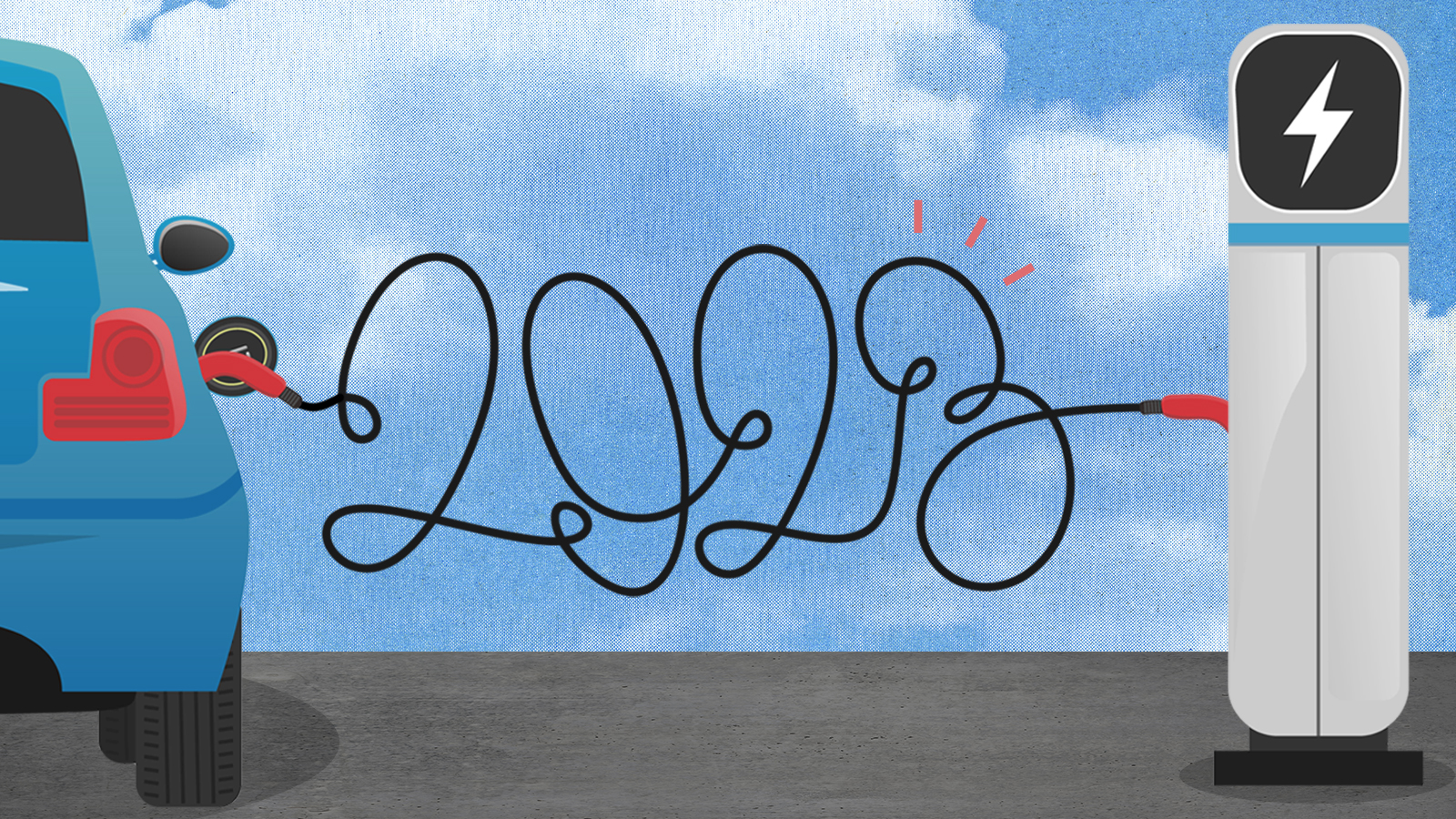Is 2023 the year of the EV?
Electric vehicle purchases grew in 2022. Are they here to stay?


A free daily email with the biggest news stories of the day – and the best features from TheWeek.com
You are now subscribed
Your newsletter sign-up was successful
The purchase of electric vehicles (EVs) skyrocketed in 2022, accounting for 5.6 percent of all new vehicles sold in the U.S., compared to just 1.4 percent back in 2019, CNN reports. Experts predict that EVs will continue to grow in 2023. Here's everything you need to know:
Why did EV purchases increase last year?
Buying an EV become more commonplace in 2022 despite the supply chain issue making them harder to manufacture, explains Wired. The two main reasons for this growth were more government incentives and more options on the market.
Gas prices were also at an all-time high during parts of 2022, pushing people to consider other options beyond traditional fossil-fueled cars. Concurrently, Biden's Inflation Reduction Act was passed in August to implement tax credits for EV purchases, bringing pricetags down to "as little as $20,500 for a Nissan Leaf," writes Grist, "and there are more than a dozen other models available for less than $40,000." New York and California, two of the most populous states, also passed legislation requiring the exclusive sale of electric vehicles or hybrids by 2035.
The Week
Escape your echo chamber. Get the facts behind the news, plus analysis from multiple perspectives.

Sign up for The Week's Free Newsletters
From our morning news briefing to a weekly Good News Newsletter, get the best of The Week delivered directly to your inbox.
From our morning news briefing to a weekly Good News Newsletter, get the best of The Week delivered directly to your inbox.
It helps that Tesla is not the only company putting out EVs, writes The Wall Street Journal. "For the longest time, the majority of the EVs on the road were Teslas, and they still get the lion's share of sales, but they're now hardly the only game in town," commented Matt Degen, an editor at Cox Automotive, to CNN. Speaking to Grist, John Howard, the director of product management for Experian Automotive, agreed: "From an affordability standpoint, the chase is on."
For example, Ford, Hyundai, and General Motors all released EV models that began to take off this year. Ram also recently revealed a new EV pickup truck, expanding the types of EV vehicles available.
What changes have been made in the industry?
One of the biggest changes is that EVs are now available at a variety of price points, making them more accessible, CNN writes. "There's different segments, there's different price levels," said Degen. "It's not just having to spend $50,000 or $100,000 on an EV anymore." The less expensive vehicles are also starting to meet higher quality standards, including being more efficient as well as charging faster. These advancements will only continue as global automakers have pledged to spend close to $1.2 trillion through 2030 to develop and produce electric vehicles, per Reuters.
One area where there is room for improvement is the availability of charging stations, notes Wired. However, more strides are being made to position the infrastructure necessary to support a widespread transition to EVs. In Massachusetts, the government has passed a $400 million plan to install thousands of EV chargers, making it easier to switch.
A free daily email with the biggest news stories of the day – and the best features from TheWeek.com
There has been an overall push to move away from fossil fuels due to the impending climate crisis. The United Nations Paris Climate Agreement brought nations together to promise to keep global warming below 1.5 degrees Celsius, which involves becoming net zero by 2050. This is prompting governments to encourage people to move away from gas cars.
Will growth continue this year?
Experts posit that the 2022 growth will continue into 2023. The Biden administration's clean vehicle credit was implemented at the start of the year, incentivizing anyone in the market for a new car to consider an EV. Last year was also defined as the "tipping point" for EVs, an important benchmark for their eventual widespread adoption. "Once you cross that 5 percent [of new car sales] threshold and stay above there, that's when past history of disruptive technology shows us that you start to see the beginning of exponential adoption growth," Stan Cross, the electric transportation policy director for the Southern Alliance for Clean Energy, explained to USA Today.
Bloomberg predicts that electric vehicles will soon be available in places like Costco, an ideal marketplace for middle-class families. This year, a whole bunch of new EVs will be released by a variety of brands, making the market more competitive.
On the supply side, experts predict that supply chain issues are likely to decrease. "There's a lot of pressure on these supply chains to figure out how we do things efficiently," commented Aidan Madigan-Curtis, a partner at Eclipse Ventures. "One of the areas that we're most interested in exploring is on the mineral discovery side." There are expected to be improvements in battery technology as well, writes Insider, due to the Biden administration's push toward battery manufacturing and mining in the U.S.
Charging complications are also likely to improve because the prevalence of EVs will prompt investment in infrastructure to charge. "The risk of deploying EV-charging infrastructure has reached a point where it's no longer risk capital," explained Brian Walsh, the head of Wind Ventures.
Overall, EVs are likely here to stay — it's just a matter of ironing out the kinks in manufacturing. "Electric cars are normal now," Matthew Nelson, director of governmental affairs at Electrify America, a fast-charging station company, stressed to The Washington Post. "This is a car that does what you expect a car to do."
Devika Rao has worked as a staff writer at The Week since 2022, covering science, the environment, climate and business. She previously worked as a policy associate for a nonprofit organization advocating for environmental action from a business perspective.
-
 How the FCC’s ‘equal time’ rule works
How the FCC’s ‘equal time’ rule worksIn the Spotlight The law is at the heart of the Colbert-CBS conflict
-
 What is the endgame in the DHS shutdown?
What is the endgame in the DHS shutdown?Today’s Big Question Democrats want to rein in ICE’s immigration crackdown
-
 ‘Poor time management isn’t just an inconvenience’
‘Poor time management isn’t just an inconvenience’Instant Opinion Opinion, comment and editorials of the day
-
 How climate change is affecting Christmas
How climate change is affecting ChristmasThe Explainer There may be a slim chance of future white Christmases
-
 Why scientists are attempting nuclear fusion
Why scientists are attempting nuclear fusionThe Explainer Harnessing the reaction that powers the stars could offer a potentially unlimited source of carbon-free energy, and the race is hotting up
-
 Canyons under the Antarctic have deep impacts
Canyons under the Antarctic have deep impactsUnder the radar Submarine canyons could be affecting the climate more than previously thought
-
 NASA is moving away from tracking climate change
NASA is moving away from tracking climate changeThe Explainer Climate missions could be going dark
-
 What would happen to Earth if humans went extinct?
What would happen to Earth if humans went extinct?The Explainer Human extinction could potentially give rise to new species and climates
-
 Bacteria can turn plastic waste into a painkiller
Bacteria can turn plastic waste into a painkillerUnder the radar The process could be a solution to plastic pollution
-
 New York plans first nuclear plant in 36 years
New York plans first nuclear plant in 36 yearsSpeed Read The plant, to be constructed somewhere in upstate New York, will produce enough energy to power a million homes
-
 Sodium batteries could make electric flight viable
Sodium batteries could make electric flight viableUnder the Radar Low-cost fuel cell has higher energy density and produces chemical by-product that could absorb CO2 from the atmosphere
